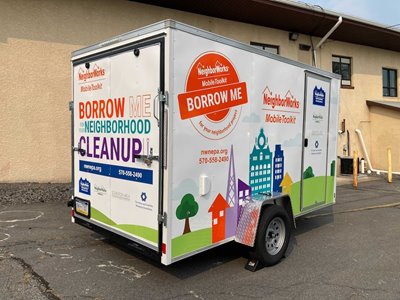When a group of residents from NeighborWorks Northeastern Pennsylvania (NEPA) attended NeighborWorks America's Community Leadership Institute, a training event aiming to strengthen the voice and skills of community and resident leaders, they already had an idea of what they wanted to do. Their project idea? Prepare a set of tools that the community could use to clean up neighborhoods and parks. In late summer, the plan came to fruition in the form of the Mobile Toolkit. A trailer houses tools such as a lawnmower, a string trimmer, a power washer, wheelbarrows, rakes, shears and more. The toolkit is available to nonprofits and neighborhood associations, along with community and civic groups.
 Residents used it for the first time Aug. 22 to clean up the race route for a Scranton bike race, says Gerard Hetman, community development specialist with the Pennsylvania NeighborWorks affiliate. "It was an amazing feeling to see the Mobile Toolkit in use for the first time," Hetman says. "Our partners at Scranton Tomorrow used the tools and equipment to clean up an overgrown section of a city neighborhood, clearing the way for a great event and leaving a positive impact on neighborhood quality of life."
Residents used it for the first time Aug. 22 to clean up the race route for a Scranton bike race, says Gerard Hetman, community development specialist with the Pennsylvania NeighborWorks affiliate. "It was an amazing feeling to see the Mobile Toolkit in use for the first time," Hetman says. "Our partners at Scranton Tomorrow used the tools and equipment to clean up an overgrown section of a city neighborhood, clearing the way for a great event and leaving a positive impact on neighborhood quality of life."
Staff at NeighborWorks NEPA had seen projects built around tools at other NeighborWorks network organizations, including NeighborWorks Pocatello in Idaho, which established a tool lending library. "There was a desire to start that here," Hetman says. "We wanted to put together a package of tools that people could use together. We saw the need."
NeighborWorks Northeastern Pennsylvania hopes to see groups use the tools to cleanup lots and parks, plant trees and more. "We encourage people to borrow the mobile toolkit and do some good work in their neighborhoods," he says. Funding for the project came from a grant from NeighborWorks America. Additional funding came through the Scranton Area Community Foundation and the Harry and Jeanette Weinberg Foundation.
There is no cost to borrow the Mobile Toolkit, though NeighborWorks NEPA requires groups to pay a refundable fee to protect against the possibility of damage or loss of tools and equipment. Hetman expects groups to use the toolkit through October for fall cleanup. Next year, the toolkit will be available for a full summer season.
For NeighborWorks network organizations interested in starting a similar project, this is how Hetman's team divided up the tasks:
- Trailer and tool acquisition. One team worked on putting together a list of tools that would be a good fit for the program and pricing them. The group also scouted and priced out trailers for purchase.
- Marketing and branding. This team put together a concept for the design and the graphics. They also gave the project an identifiable name: The Mobile Toolkit.
- Research and policy development. This group reached out to NeighborWorks Pocatello to learn about paperwork and administrative logistics.
Holly Yorkonis, community revitalization coordinator at United Neighborhood Center of NEPA and a member of the CLI team, says her group wanted the name of the toolkit to be obvious, so that people seeing signs or the trailer would know exactly what they had to offer. The logo includes the geographic landscape of Scranton using orange (the color of NeighborWorks Northeastern Pennsylvania), green (the color of NeighborWorks America) , and purple (because it complements the other two).
NeighborWorks NEPA will work with students at Johnson College to keep the tools in working order.
Yorkonis hopes to see organizations collaborate and coordinate as they borrow the toolkit. She also hopes groups will help one another with cleanup projects. "I think it will have a collective impact on the city and on beautification projects," she says.

